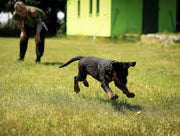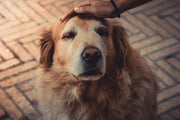
Many dogs, just like us humans, sometimes resort to obsessive behavior. It may be out of boredom, anxiety, or an underlying issue.
Common dog obsessive behaviors
The goal of this article is not to discuss obsessive behaviors such as:
- Hallucinating (fly biting)
- Circling
- Fence running
- Pica (appetite for non-food substances such as dirt, rock, or feces)
- Staring
- Vocalizing
If your dog is prone to the behaviors listed above, I recommend asking your veterinarian what the cause may be. These behaviors are typically called obsessive-compulsive disorder (O.C.D.).
In this article, we will focus on discussing three common obsessive behaviors:
- Licking
- Chewing
- Scratching
Since these three behaviors may lead to secondary infections and, in some cases, open wounds, it is paramount for dog owners to understand the causes with their veterinarian.
If your veterinarian cannot identify any medical cause, then you may try to redirect your dog's behavior to something healthier.
Understanding the reason behind your dog's licking, chewing, and scratching

Licking, chewing, and scratching may have various causes. They may be the visible symptom of an invisible cause. Your veterinarian will be able to examine your dog and search for common known causes, including:
- Flea saliva allergy
- Joint pain
- Secondary bacterial or fungal infection
- Allergic reaction
- Mange
- Parasites
- ...and more.
Many dog owners report that even after a thorough exam, their veterinarian hasn't been able to confirm a cause for their dog's obsessive licking, chewing, or scratching.
If that is the case, and only after checking with a veterinarian, you can try to distract your dog from these behaviors.
3 healthy ways to distract your dog
One easy way to distract your dog from licking, chewing, and scratching himself is to focus his mouth and paws on something else.
We will discuss three types of chews:
- Approved dental chews that are genuinely beneficial in preventing plaque and tartar accumulation.
- Long-lasting natural chews: antlers and yak chews.
- Long-lasting chew toys.
This list is not meant to be complete, but all three options are considered healthy for your dog and may help prevent excessive licking, chewing, and scratching.
Veterinary Oral Health Council approved dental chews
The Veterinary Oral Health Council (VOHC) is the only organization that evaluates the data produced by dental-product testing to verify that the product can prevent plaque and tartar accumulation.
Their seal of approval is highly valued among dental-product manufacturers since it is proof that the product is effective in caring for your pet's dental health.
Among others, the VOHC approved the following dental chews:
- Hill's Prescription Diet Dental Care Chew Dog Treats
- C.E.T. VEGGIEDENT Chews
- Greenies
- Purina Pro Plan Dental Chewz
- OraVet Dental Hygiene Chews
- WHIMZEES
Dental chews often require your dog to chew for a long time, which will keep him distracted from other behaviors.
Information for dogs with food sensitivities

While the VOHC approves the above-listed dental chews, some may contain known food allergens such as animal protein (beef, chicken), dairy, or grains.
Research the ingredients against the known dog food allergens.
C.E.T. VEGGIEDENT Chews are easily digestible because they don't contain animal protein. However, they also include ingredients like soy protein, a known food allergen (not as common as beef or chicken, however).
Hill's Prescription Diet Dental Care Chew Dog Treats may be the healthiest option from the list above because they don't contain known allergens.
Nutritious long-lasting chews
Two kinds of natural chews can distract your dog from excessive licking and chewing: antlers and yak chews.
Antlers
Antlers are natural chew toys. Before getting your dog some antlers, please check with your veterinarian as antlers are considered hard chew toys and may, in some cases, lead to broken teeth. It would help if you always supervise your dog when he is chewing on antlers.
Out of all the antlers types, deer antlers usually have the hardest texture. Moose antlers, on the other hand, are softer.
Ask your veterinarian what kind of antler or antler alternative he recommends for your dog specifically.
Antlers have various benefits, such as:
- They are less likely to splinter and chip than bones.
- They have no preservatives, additives, or artificial ingredients.
- They bring essential minerals such as calcium and phosphorus.
- They may help scrape away plaque buildup.
Yak cheese chews

Yak cheese is cheese made from yaks living in the Himalayas. The Himalayan Yak is a cow-like animal living in the Himalayas. This type of cheese is high in protein but low in fat.
Like antlers, it contains no artificial flavors, colors, or preservatives.
Even dogs with food sensitivities may enjoy yak cheese chews as there is currently no research associating them with food allergies. However, please ask your veterinarian before feeding your dog Yak cheese chews.
Since Yak cheese chews are hard, they are also long-lasting.
Long-lasting chew toys
You may be wondering: what is the best chew option that is budget-friendly and still healthy?
If this is your case, look for high-quality chew toys like KONG toys. They are known to be indestructible, which means they will last a long time, even for the most destructive pups.
Consider stuffing the KONG with some mashed banana or canned pumpkin for added health benefits. You can even freeze it for those hot summer days!
Final words
There are many ways to distract your dog from obsessive behavior. Most of the time, walking your dog more may solve these issues. But, when it doesn't, you have a few healthy ways of redirecting your dog's energy, including dental chews, antlers, yak cheese chews, and chew toys you can fill with healthy deliciousness.




